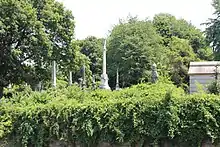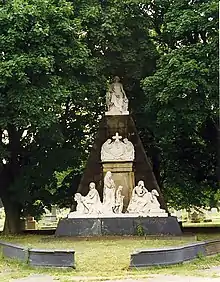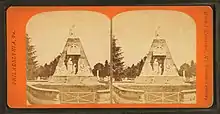Mount Vernon Cemetery (Philadelphia)
Mount Vernon Cemetery is a historic rural cemetery located at 3499 West Lehigh Avenue in the East Falls neighborhood of Philadelphia, Pennsylvania. It was established in 1856, is 27 acres in size and contains over 18,000 graves. It was neglected for decades by an absentee landlord. No plots have been sold since 1968, it was not open to the public, many graves fell into disrepair and the cemetery became heavily overgrown. In 2021, a Philadelphia judge ordered the cemetery be placed in conservatorship due to neglect.
| Mount Vernon Cemetery | |
|---|---|
 Mount Vernon Cemetery Gatehouse | |
| Details | |
| Established | 1856 |
| Location | 3499 West Lehigh Avenue, Philadelphia, Pennsylvania |
| Country | United States |
| Coordinates | 39°59′58″N 75°11′06″W |
| Type | private |
| Size | 27 acres[1] |
| No. of graves | 18,250 |
| Website | https://www.mountvernoncemetery.org/ |
| Find a Grave | Mount Vernon Cemetery |
History
_AND_MOUNT_PEACE_CEMETERY_(RIGHT)._LOCATED_ACROSS_RIDGE_AVENUE_FROM_LAUREL_HILL_CEMETERY%252C_MOUNT_PEACE_CEMETERY_WAS_FOUNDED_BY_THE_ODD_HABS_PA%252C51-PHILA%252C100-105.tif.jpg.webp)


The cemetery was established on February 28, 1856 and is located directly across Ridge Avenue from Laurel Hill Cemetery.[2]
The property was originally part of the colonial estate of Robert Ralston named Mount Peace. Another portion of the estate was purchased by the Oddfellows organization for Mount Peace Cemetery.
John Notman, the architect of Laurel Hill Cemetery's Italianate gatehouse was hired to design a larger and grander gatehouse for Mount Vernon Cemetery which was completed in 1858.[3]

In 1864, the Gardel Memorial was added to Mount Vernon. It is a memorial to Julia Hawks Gardel, the principal of a female seminary in Philadelphia,[4] who died in 1859 while traveling in Syria.[5] Her husband, Bertrand Gardel, commissioned Belgian sculptor Guillaume Geefs to create a 25-foot pyramid made of sandstone, marble and imported granite. The front of the pyramid is adorned with large marble statues which represent the continents of Asia, Europe and Africa to depict Julia's love of travel. Two statues above the pyramid door depict Hope and Faith holding a carved relief of Julia. The statue atop the pyramid represents America surrounded by emblems of the physical sciences. The memorial cost $36,000 which is the equivalent of about $2 million in current dollars. Bertrand Gardel died in 1895 and is interred in the vault beneath the memorial with his wife.[6]

In 1867, the Second Presbyterian Church burial ground on Arch Street was closed and 2,500 bodies were reinterred at Mount Vernon many from the 1700s including several Revolutionary War heroes.[6]
The Drew family plot at Mount Vernon contains generations of the Barrymore family.[7] The family lot was originally located in Glenwood Cemetery but was moved to Mount Vernon when Glenwood Cemetery was closed.[8] John Barrymore left in his will that he wished to be buried in the Drew family plot but was originally interred in Calvary Cemetery in Los Angeles, California. In 1980, his son John Drew Barrymore had his father's remains removed from the family mausoleum, cremated and reinterred in Mount Vernon Cemetery.[7] His grave was unmarked until 1992, when fans had a stone installed which had engraved upon it, "Alas poor Yorick" in a reference to his stage performance of Hamlet.[9]
Ownership Change in 1973
Joseph Dinsmore Murphy, a lawyer from Washington D.C. began his ownership of the cemetery in 1973 when he inherited it from his father.[1] The cemetery was not abandoned, however no plots were sold since 1968[10] and it became heavily overgrown. Many graves fell into disrepair and some were looted for scrap metal.[1] Mount Vernon was not open to the public[11] and the owner required an appointment be made for visitations 24 hours in advance and only for people who had a family plot in the cemetery and know the location.[5]
On May 1, 2020 the Philadelphia Development Coalition petitioned to be appointed conservator of the property due to its abandoned and neglected condition. [12]
In 2021 a Philadelphia judge ordered the cemetery be placed in conservatorship due to neglect.[1]
Notable burials
- John Barrymore (1882–1942), stage, screen and radio actor
- Maurice Barrymore (1849–1905), stage actor
- George C. Burling (1834–1885), Union Army officer during the U.S. Civil War
- John Carson (1752–1794), physician
- Georgiana Drew (1856–1893), stage actress and comedian
- John Drew (1827–1862), stage actor and theatre manager
- John Drew, Jr. (1853–1927), stage actor
- Louisa Lane Drew (1820–1897), actress and theatre owner
- Louise Drew (1882–1954), stage actress
- Sidney Drew (1863–1913), member of the Mr. and Mrs. Sidney Drew comedy team
- Sidney Rankin Drew (1891–1918), actor and film director
- Peter Stephen Du Ponceau (1760–1844), linguist, philosopher and jurist
- Christian Febiger (1749–1796), American Revolutionary War commander
- Charles Albert Fechter (1824–1879), actor
- Charlie Householder (1854–1913), professional baseball player
- William Churchill Houston (1746–1788), New Jersey delegate to the Continental Congress
- William M. Ireland (? – 1891), one of the founders of the National Grange of the Order of Patrons of Husbandry
- Samuel Jaudon (1796–1874), banker and businessman
- Lawrence Johnson (1801–1860), printing stereotyper and type-founder
- Judy Lewis (1935–2011), actress, writer, producer and therapist
- Henry Myers (1858–1895), professional baseball player
- Horace Phillips (1853–1896), major league baseball manager
- Lawrence Saint (1885–1961), stained glass artist
- Maria Louise Sanford (1836–1920), educator
- Alfred J. Sellers (1836–1908), Medal of Honor recipient
- Bill Sharsig (1855–1902), Major League Baseball co-owner and general manager
- Jonathan Bayard Smith (1742–1812), Pennsylvania delegate to the Continental Congress
- John P. Van Leer (1834–1862), Union Army officer
- Jake Virtue (1865–1943), professional baseball player
- Pelatiah Webster (1726–1795), colonial merchant and author of short essays on finances and the government of the United States
References
Citations
- Bender, William. "Judge ousts absentee owner of historic Mount Vernon Cemetery. Rehab could involve goats". www.inquirer.com. Retrieved 9 September 2021.
- Scharf, John Thomas (1884). History of Philadelphia, 1609–1884. Philadelphia: L.H. Everts & Co. p. 2360. Retrieved 23 August 2019.
moriah.
- Webster 2014, p. 143.
- "Julia Hawkes Gardel's Female Seminary School Ledgers". www.libapps.salisbury.edu. Retrieved 9 September 2021.
- "Roaming with the Roxborough Runner: Mount Vernon Cemetery". www.nwlocalpaper.com. 7 March 2016. Retrieved 7 September 2019.
- Webster 2014, p. 145.
- Keels, Thomas H. (2010). Wicked Philadelphia: Sin in the City of Brotherly Love. Charleston, SC: The History Press. ISBN 978-1-61423-105-9. Retrieved 21 September 2019.
- Lindsay, Suzanne Glover. "The Drews and Barrymores at St. Stephen's, Part II". www.ststephsphl.org. St. Stephens Episcopal Church. Retrieved 19 January 2022.
- Keels 2003, p. 54.
- Herr-Cardillo, Starr. "A Fine and Public Space: Preservationists Revive Philadelphia's Historic Cemeteries as Vibrant Spaces for The Living". www.hiddencityphila.org. Retrieved 7 September 2019.
- "Mount Vernon Cemetery – Philadelphia, Pennsylvania". www.localcemeteries.net. Retrieved 7 September 2019.
- Bender, William. "Act 135 Petition Mount Vernon Cemetery". Retrieved 9 March 2022.
Sources
- Keels, Thomas H. (2003). Philadelphia Graveyards & Cemeteries. Arcadia Publishing. ISBN 0-7385-1229-X.
- Webster, J.P. (2014). Vanishing Philadelphia: Ruins of the Quaker City. The History Press. ISBN 978-1-62585-134-5.
External links
- Mt. Vernon Cemetery Conservation Company
- Mount Vernon Cemetery at Find a Grave
- Philadelphia Community Development Coalition website
- Video of Mount Vernon Cemetery grounds uploaded April 24, 2016